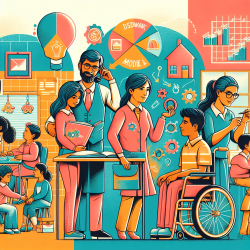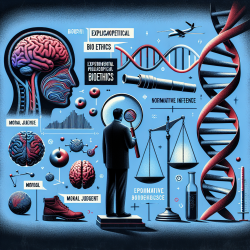Introduction
Adolescence is a critical period of rapid biobehavioral change, characterized by increased neural maturation and sensitivity to environmental contexts. The recent research article, "Experience-dependent neurodevelopment of self-regulation in adolescence," highlights the profound influence of social, cultural, and socioeconomic contexts on the development of self-regulation skills during this period. This blog post aims to guide practitioners in enhancing their skills by implementing insights from this research, ultimately improving outcomes for adolescents.
Understanding Experience-Dependent Neurodevelopment
The research emphasizes that adolescence is marked by heightened plasticity, where structural and functional brain changes occur, driven by environmental inputs. Key brain regions such as the amygdala and medial prefrontal cortex undergo significant development, influencing self-regulation skills. These changes are crucial for adapting to the complex social and cognitive environments adolescents navigate.
Implications for Practitioners
Practitioners can leverage this understanding by creating environments that foster positive self-regulation development. Here are some actionable steps:
- Incorporate Social Contexts: Encourage activities that promote social interaction and peer support, as these can enhance self-regulation through social learning and modeling.
- Tailor Interventions to Cultural Contexts: Recognize and respect cultural differences in emotion regulation strategies. Adapt interventions to align with cultural values and norms, ensuring they are relevant and effective.
- Address Socioeconomic Barriers: Provide resources and support to mitigate the effects of socioeconomic disadvantage on brain development. This may include access to educational materials and safe, supportive environments.
Encouraging Further Research
While the current research provides valuable insights, there is a need for further exploration into the specific mechanisms through which environmental contexts influence neurodevelopment. Practitioners are encouraged to engage in or support research efforts that delve deeper into these areas, particularly focusing on:
- Longitudinal Studies: Conduct studies that track changes over time to better understand the long-term impacts of different environmental factors on adolescent development.
- Intervention Trials: Test the efficacy of various interventions designed to enhance self-regulation skills, particularly those that are culturally and contextually tailored.
Conclusion
Understanding the experience-dependent neurodevelopment of self-regulation in adolescence offers practitioners a framework to enhance their approaches and interventions. By considering the complex interplay of social, cultural, and socioeconomic factors, practitioners can create more effective strategies to support adolescents in developing robust self-regulation skills.
To read the original research paper, please follow this link: Experience-dependent neurodevelopment of self-regulation in adolescence.










